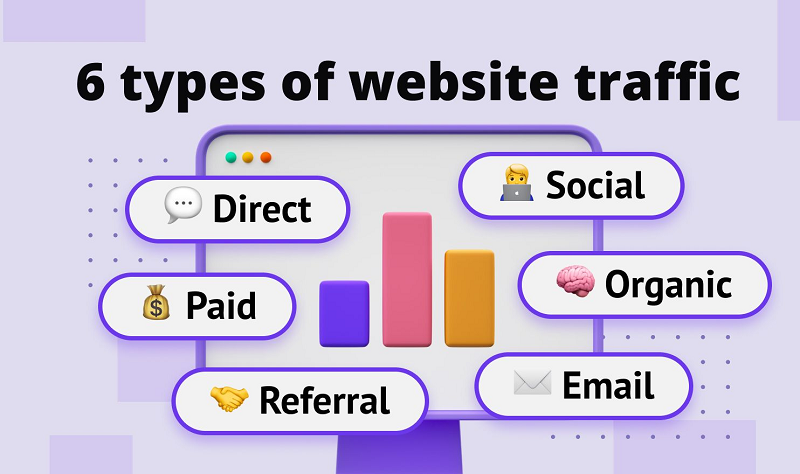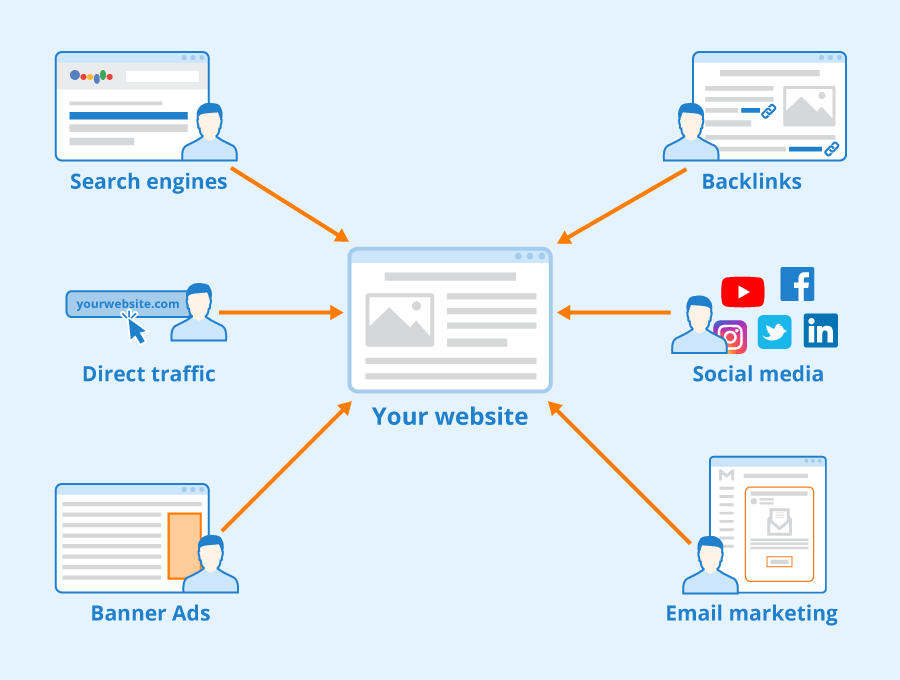Every website that exists will have its own mission. And whatever the purpose, it needs to have information access from customers (web traffic). So how to get more users to visit your website? Follow the article below of MarkKnow to learn the term Traffic? How to increase traffic to push your website to the Top!
What is web traffic?
Traffic is a very familiar term in the field of SEO. It describes in detail the number of users accessing a website. The shared content of websites is not the same. So the number of visits of each website is also completely different. And the amount of traffic is considered a way to determine the development milestones of a website.
Why should you care about traffic?
Traffic is always the target of SEOers and website administrators:
Increase Customer Conversion
Customer conversion rate is the final destination of the SEO process. For each website, the higher the traffic, the higher the chance of conversion. Usually, websites that share News or knowledge will have higher traffic than Sales websites. The more customers search for information on the website, the more opportunities there are for customer conversion. These are the web traffic high conversion potential
Increase ROI index in Ads
ROI (Return on Investment) is the actual profit index on the cost spent. In Ads campaigns, each click on the website will correspond to a potential traffic. However, if these clicks are not converted into sales. It will cost a lot of money. Potential traffic = Increase conversion rate = Increase sales
Building Corporate Branding
Providing attractive content on the website will attract more visitors. web traffic. The more traffic to your website, the higher the chance that users will know your Brand.
Increase Website Ranking
Not only does it help increase sales. But traffic will have a positive impact on your website’s ranking. The more traffic flows to the website, the more Google will assume the website is of higher quality. This brings many opportunities to increase the website’s ranking.
Share 6 Basic Types of Web Traffic
Users have many ways to search for information on the website. Depending on each search method, traffic also has different origins. Currently, web traffic There are 6 basic types:
- Referral Traffic: Traffic received when users access the website through a link on another website.
- Social Traffic: Traffic received when users access the website through links on social networking sites such as: facebook, zalo, instagram, tiktok,…
- Direct Traffic: Traffic received when users access the website through searching the URL on search engine toolbars.
- Organic Traffic: Web Traffic received when users access the website through direct search on Google.
- Paid Traffic: Traffic received when users access the website by clicking on Advertising links.
- Email Traffic: Traffic received when users access the website by clicking on links provided via email.

How much potential traffic does your website have?
To estimate the potential traffic on the website, users can follow these 2 steps:
Step 1: Determine average monthly keyword searches
There are many free and paid tools available today that allow you to determine user keyword search demand. Among them, Google Keyword Planner is a highly preferred tool today. Just enter the keyword and wait for the keyword search volume results.
Step 2: How to calculate web traffic potential on article
Web Traffic Potential = Volume * CTR * 2
In which, CTR is the average index of articles in the top 5 on Google.
Guide to push keywords to increase web traffic
Keywords are the most basic and most frequent aspect of SEO. Keyword SEO is the fastest way to bring content to users through Google tools. However, stuffing too many keywords in an article is really not a good way. Because Google is tightening content.
Therefore, focus on research and only focus on SEO one keyword for one article. The research process and decision on which type of keyword to use depends on the main purpose of the SEOer.
Using Short Tail Keywords
Short Tail Keywords usually have a very high search volume and are searched by many users. If your website is only aimed at attracting users, you can use short keywords. Short keywords will have a very high competition but the conversion rate is not high. However, using short keywords is an opportunity to show the quality of your website.
Long Tail Keywords to Increase Web Traffic
Long Tail Keywords (long keywords) often help websites have better rankings. At the same time, SEO for long keywords also helps short keywords have higher positions. When users search for information with longer keywords, it means that their needs are higher. Therefore, long keywords often have a much higher conversion rate than short keywords.
Using Local Keywords
Local keywords help users search for information related to a certain location. Then, users will search for location information faster. At the same time, Google can also suggest information to users who are located near that location.

Comment Policy: We truly value your comments and appreciate the time you take to share your thoughts and feedback with us.
Note: Comments that are identified as spam or purely promotional will be removed.
To enhance your commenting experience, consider creating a Gravatar account. By adding an avatar and using the same email here, your comments will feature a unique and recognizable avatar, making it easier for other members to identify you.
Please use a valid email address so you can receive notifications when your comments receive replies.
